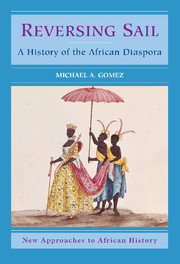5 - Enslavement
Summary
Africans experienced a most painful introduction to the New World. The forced march to the sea and the subsequent horrific sea voyage represent the birth of not only the modern African Diaspora but also modernity itself. Europe's rise and expansion were undergirded by slavery; its economic prosperity was fundamentally related to the exploitation of Africans (an argument championed by Trinidadian scholar Eric Williams). The vast wealth, considerable privilege, and seemingly limitless opportunities associated with American elites were all achieved on the backs of impoverished Africans and subjugated Native Americans. To be sure, a peasantry and working class from all points of the globe would eventually find themselves in the Americas, where they would also make contributions under exploitative conditions. Even so, it was enslaved African labor that paved the way for all to come.
Focus on the introduction of Africans as enslaved workers does not reject the possibility of a pre-Columbian African presence. Artifacts, archaeological remains, linguistic evidence, Native American traditions, and European explorer accounts render plausible the idea that Africans crossed the Atlantic at some unspecified point prior to Columbus. Indeed, there are references in West African sources to transatlantic voyages under imperial Mali in the fourteenth century, so the effort was probably made. It would not appear, however, that these earlier Africans achieved a regular correspondence with Native Americans, a steady commerce that for subsequent Africans was eventually established at their very considerable expense.
- Type
- Chapter
- Information
- Reversing SailA History of the African Diaspora, pp. 82 - 108Publisher: Cambridge University PressPrint publication year: 2004

